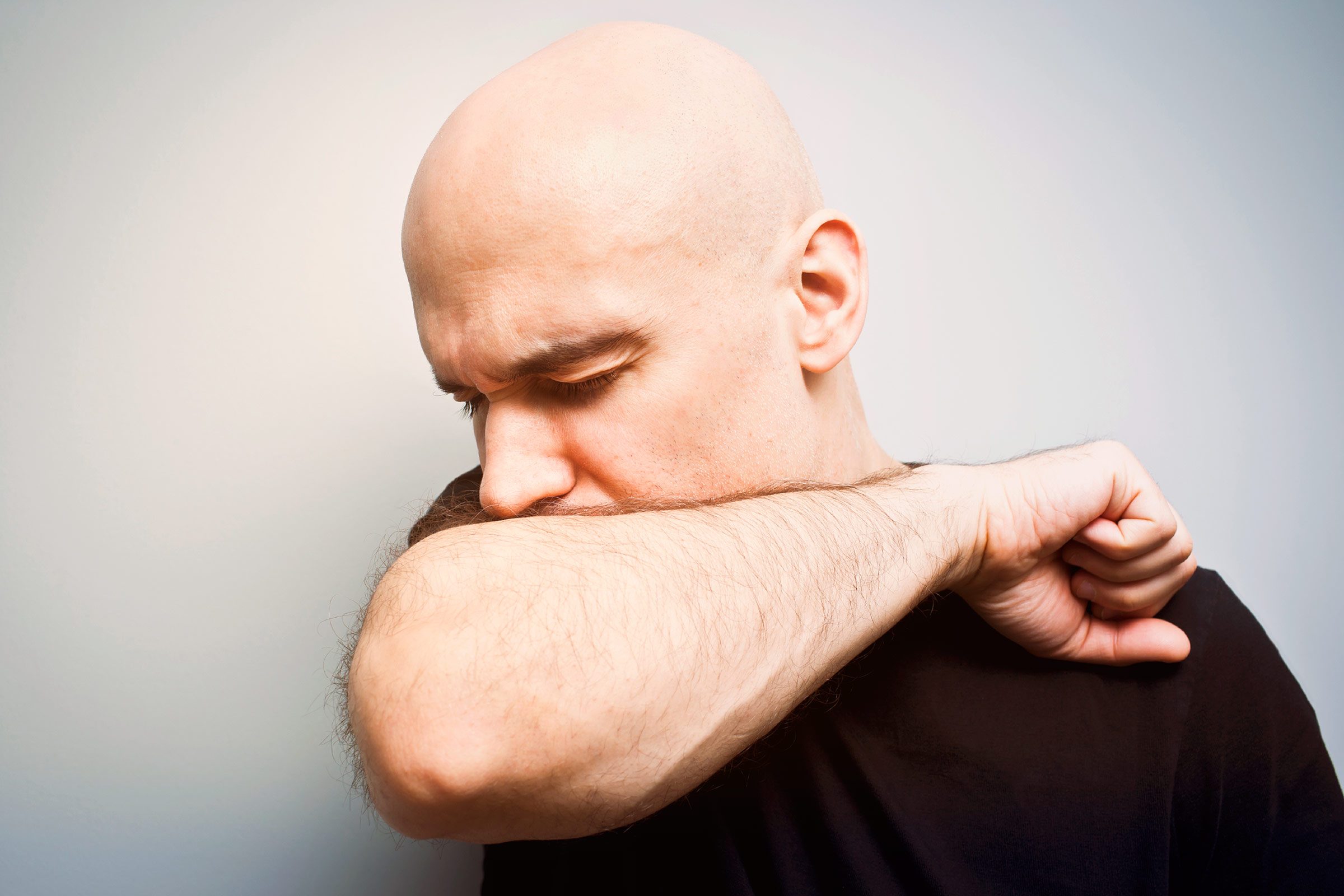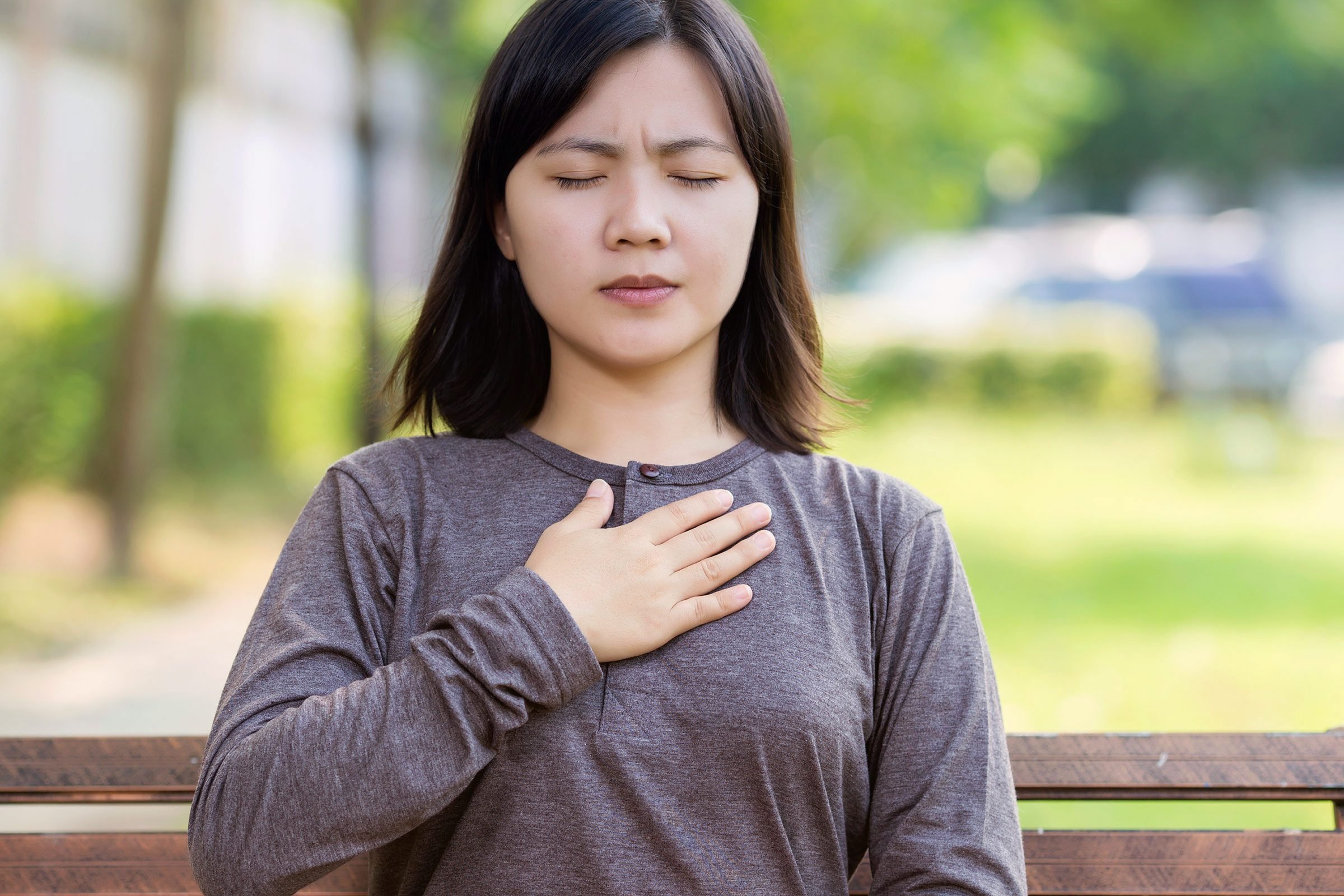- লিঙ্ক পান
- X
- ইমেল
- অন্যান্য অ্যাপ
7 Symptoms of Asthma Every Adult Should Know
Some 18 million adult Americans suffer from asthma, a condition in which inflamed airways make breathing difficult. Wheezing—a whistling or squeaky sound made when you breathe—is a key asthma symptom. Here are other, more subtle signs of asthma.
You’re in your forties
 ISTOCK/NADOFOTOS
ISTOCK/NADOFOTOS
The peak years for the onset of asthma in adulthood are between 45 and 50, says Richard F. Lockey, MD, director of the Division of Allergy & Immunology at University of South Florida College of Medicine. Most at risk of developing symptoms of asthma are those who have allergies, or those who suffered from the disorder as kids but thought they “outgrew” it. Many cases start after an infection. “You get a cold and suddenly you have asthma,” Dr. Lockey says. Don't miss these other 12 surprising asthma triggers.
You have a cough that doesn’t go away
 ISTOCK/MICHELLE GIBSON
ISTOCK/MICHELLE GIBSON
“It’s easy to think that coughing means you have a cold or bronchitis—but if that cough keeps coming back, it may be a sign of asthma,” says the American College of Allergy, Asthma & Immunology (ACAAI). Dr. Lockey notes, “Your cough becomes worse after you laugh or lie down. And it comes from the chest, not the throat.” In one type of asthma, known as cough-variant asthma, the only symptom is a chronic cough. “People with this kind of asthma generally don’t get relief from over-the-counter cough medicine; successful treatment requires prescription asthma medication, often in the form of inhalers,” the ACAAI notes. See if these home remedies for coughs can help relieve your symptoms. And here's when a cough could be a symptom of lung cancer.
You sigh, yawn, or take deep breaths a lot
 ISTOCK/WAVEBREAKMEDIA
ISTOCK/WAVEBREAKMEDIA
These behaviors don’t necessarily mean you’re suffering from world-weariness—they may, in fact, be symptoms of asthma. All three ways of breathing involve getting more oxygen into your body and more carbon dioxide out—an unconscious effort to remedy the imbalances caused by constricted airways. Learn how to keep asthma flare-ups under control.
You’re often tired
 ISTOCK/PEOPLEIMAGES
ISTOCK/PEOPLEIMAGES
“Wheezing and coughing in asthmatics often become much more severe during the night. It is not clear whether there is a circadian rhythm factor (the rhythm of biological functions occurring in a 24-hour periodic cycle) responsible for these nighttime disturbances or whether sleep in some way contributes to them,” reports the National Sleep Foundation. Interrupted sleep may be the first symptoms—and it’s a serious problem. After a bad night’s sleep, you’re not only low on physical energy, you’re also less mentally sharp. Chronic sleeplessness has been linked to increased risk of heart disease and diabetes, and some experts feel that it may make a case of asthma become more severe. Fortunately, when asthma is controlled, sleep problems tend to go away. Here's how to breathe for better health.
CONTENT CONTINUES BELOW AD
Your chest feels tight
 ISTOCK/JAN-OTTO
ISTOCK/JAN-OTTO
After running a 10K race, Anne-Marie Brooks had trouble breathing and felt a tightness in her chest. Her husband, concerned that the exertion might have brought on a heart attack, took her to the emergency room. There, the 48-year-old teacher learned she wasn’t suffering from cardiac trouble but from something she thought she’d left behind 36 years earlier—asthma. “It never dawned on me that I might be having an asthma attack,” Brooks says. (But here are the silent signs of heart attack to memorize.) When the muscles around your airways constrict, your chest may become tight. “This may feel like something is squeezing or sitting on your chest,” says the National Heart, Lung, and Blood Institute. A study published in the Postgraduate Medical Journal reported that of 100 asthma patients (average age 45) admitted to a hospital, 78 percent experienced chest pain, which was worsened by coughing, inhaling deeply, and moving, and made better by sitting up. People often mistake this tightness for heart attacks. Your physician or an ER can figure out what’s going on and provide appropriate treatment. Don't miss these essential tips for preventing an asthma attack.
You’re taking in rapid, shallow breaths
 ISTOCK/CHAMPJA
ISTOCK/CHAMPJA
For some people, slow and rapid breathing can be one of the symptoms of asthma. “Use of the muscles at the base of the neck and between the ribs may be more exaggerated than normal,” according to the University of Maryland Medical Center. At rest, the normal breathing rate for adults is 12 to 20 breaths per minute. Hyperventilation is defined as breathing 30 times a minute (every two seconds) or faster. Find out how to spot the symptoms of exercise-induced asthma.
You’re allergic to cats
 ISTOCK/YSBRAND COSIJN
ISTOCK/YSBRAND COSIJN
While more than 50 percent of asthma cases also involve allergies, being allergic to cats is a particularly strong risk factor, according to a 2007 study by the National Institutes of Health. Cat allergens were involved in almost 30 percent of asthma cases. Researchers are continuing to study whether cat allergies trigger asthma or actually influence its development. These are allergy myths you shouldn't believe.
- লিঙ্ক পান
- X
- ইমেল
- অন্যান্য অ্যাপ
মন্তব্যসমূহ
একটি মন্তব্য পোস্ট করুন